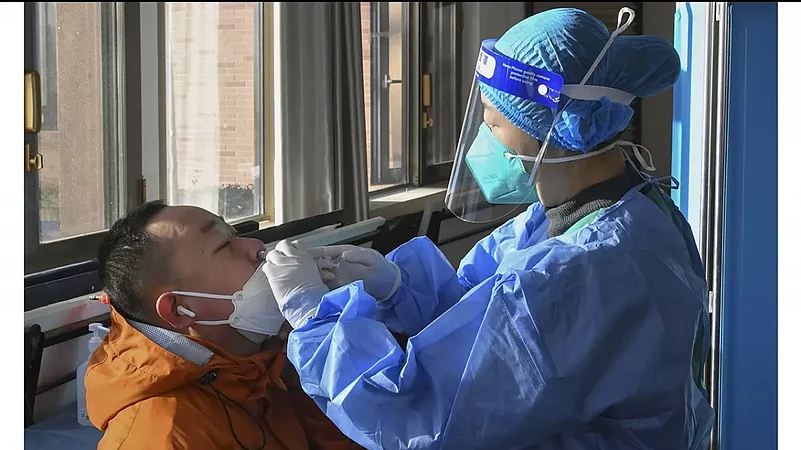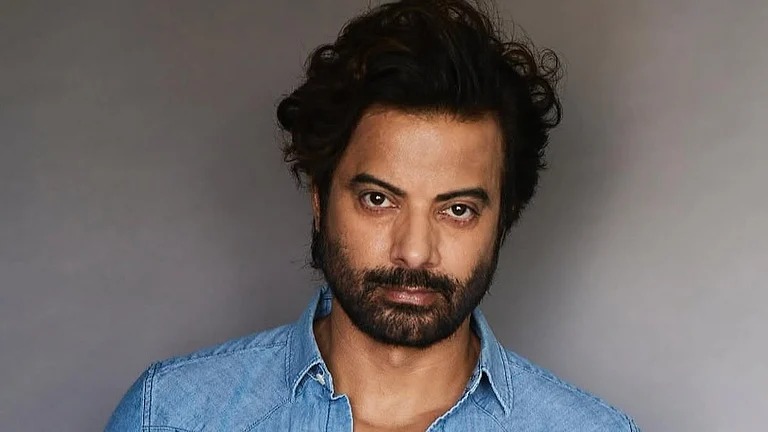In the wake of Covid-19 surge in China and elsewhere abroad, the Union government has laid out a number of steps to be taken by the state governments, Union territory (UT) administrations, and the general public.
The steps recommendated by the Union government include increased genome sequencing, more surveillance, and use of mask in crowded places.
These steps come as Union Health Minister Mansukh Mandaviya held a meeting to review the Covid-19 situation in the country. Following the meeting, he said that while the Covid-19 pandemic is not over, the government is prepared for any situation.
The Covid-19 surge in China, which is overwhelming the Chinese healthcare system, and increase in cases elsewhere, such as in the United States and South Korea, has led to concerns in India as well. The winter season and the Christmas-New Year phase where people go outdoor for celebrations is a relatively vulnerable moment for communicable diseases like Covid-19.
Here we explain what the Union government has recommended so far.
Health Minister Mandaviya holds review meeting
Union Health Minister Mansukh Mandaviya on Wednesday held a meeting to review the Covid-19 situation in India. The meeting was attended by top officials.
The officials who attended the Covid-19 review meeting were:
- Union Health Secretary Rajesh Bhushan
- Union Pharmaceuticals Department Secretary S Aparna
- Biotechnology Department Secretary Rajesh S Gokhale
- Ayush Ministry Secretary Vaidya Rajesh Kotecha
- Indian Council of Medical Research (ICMR) Director General Rajiv Bahl
- Member (Health) of NITI Aayog Dr VK Paul
- National Technical Advisory Group on Immunization (NTAGI) Chairman Dr NK Arora
Following the meeting, Mandaviya said on Twitter that he has directed all the concerned officials "to be alert and strengthen surveillance".
A statement by the Health Ministry said Mandaviya noted that "the upcoming festive season" and called on officials to be vigilant.
"Union Health Minister noted the importance of being prepared and remaining alert against new and emerging strains of Covid-19, especially in view of the upcoming festive season. Underlying and reiterating that Covid is not over yet, he directed the officials to be fully geared up and strengthen surveillance. He urged people to follow COVID Appropriate Behaviour and get vaccinated against Covid-19," said the Health Ministry statement.
In line with earlier directive, Mandaviya also requested states and UTs to carry out genone sequencing on daily basis.
Daily genome sequencing of Covid-19 cases
The Union government has asked all states and UTs to carry out increased genome sequences to identify any new emerging coronavirus variant at the earliest.
"States and Union territories have been requested to send samples of all Covid-19 positive cases to INSACOG Genome Sequencing Laboratories (IGSLs) on a daily basis for sequencing to track new variants, if any," said the Union Health Ministry in its statement.
INSACOG stands for Indian SARS-CoV-2 Genomics Consortium. It is a consortium of 54 laboratories across India to monitor the genomic sequensing of Covid-19 samples. This is a multi-agency initiative which gives crucial data that gives a better picture of the viral spread.
Genome sequencing is the scientific procedure to find out and understand the genetic structure of any organism, ranging from a virus to human beings.
SARS-CoV-2, the virus that causes Covid-19 disease, has undergone evolution since it first emerged and has branched into several variants and sub-variants. These variants and sub-variants are identified when genetic structure of the virus is studied via genome sequencing and new changes are found.
Notably, the last surges in India were driven by coronavirus variants that were new at the time. The deadly second wave was driven by Delta variant and the third wave was driven by highly infectious Omicron variant. The current wave in China is being driven by an Omicron sub-variant."
A new and highly transmissible BF.7 strain of the Omicron variant has been found to be behind a wider surge of COVID infections in China," said the Union Health Ministry.
Increased Covid-19 surveillance
The Union Health Ministry has asked the states and UTs to increase Covid-19 surveillance.
"Underlying and reiterating that Covid-19 is not over yet, he [Health Minister Mandaviya] directed the officials to be fully geared up and strengthen surveillance. He urged people to follow COVID Appropriate Behaviour and get vaccinated against Covid-19," said the Union Health Ministry.
The latest Covid-19 surveillance guidelines were issued in June, titled Operational Guidelines for Revised Surveillance Strategy in context of COVID-19.
Mandaviya reiterated the guidelines in the Wednesday's meeting.
"Union Health Ministry has already issued “Operational Guidelines for Revised Surveillance Strategy in context of COVID-19” in June 2022 which calls for early detection, isolation, testing and timely management of suspected and confirmed cases to detect and contain outbreaks of new SARS-CoV-2 variants. Union Health Minister directed officials for ensuring effective implementation of the same," said the Health Ministry.
The June surveillance guidelines lay out how travellers and residents are to be monitored and when and how serological surveys and sewage-wastewater surveillance should be carried out to get a better picture of the prevailing Covid-19 situation in the area.
Mask usage, Covid-appropriate behavior
The Union government has also asked people to wear masks and adhere to Covid-19 appropriate behaviour.
Though most mask-mandates have been withdrawn with the improvement of Covid-19 situation, masks still remain the main protective feature.
As SARS-CoV-2 virus primarly enters a human via nose or mouth, a good mask is key to prevent transmission. The government says the mask you should wear should be three-layered. Surgical masks should not be reused. There are also advanced N-95 and N-99 masks.
NITI Aayog member (Health) Dr VK Paul advised people to wear masks in crowded places. Paul was in the meeting chaired by Mandaviya.
"People should wear masks in crowded areas. Those who have comorbidities or are elderly should especially adhere to this," Paul said.
People should take booster doses
The government has also urged people to take booster doses of Covid-19 vaccines, dubbed precaution doses by the government.
While India has relatively higher coverage of first and second doses, precaution doses coverage is very law.
NITI Ayog's Paul said only 27-28 per cent people have taken precaution doses. Highlighting this, he urged the public to take precaution doses.
Vaccines prevent deaths and severe disease among the vaccinated people and are also known to reduce transmission. Therefore, Covid-19 vaccination, among with Covid-appropriate behaviour such as wearing masks, is key to preventing Covid-19 infections.
Random Covid testing at airports
In the wake of Covid-19 surge in China and elsewhere abroad, the Union government has decided to randomly test international arrivals at airports.
"Random sample testing will be done for international air passengers arriving from various countries including China," a source told PTI.
Sources said three cases of Omicron subvariant BF.7, the strain driving China's current surge of Covid cases, have been detected in India so far.
(With PTI inputs)


























